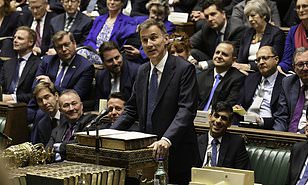Jobseekers who don’t land paid work after 18 months will be forced to do ‘work placements’ under a clampdown on joblessness.
Jeremy Hunt said that people still unemployed after receiving help for a year and a half will have to work where they are told to ‘increase their skills and improve their employability’ in his Autumn Statement.
And those who fail to even try to look for work will have their benefits stopped entirely after as little as six months, he told MPs this afternoon. This will not apply to those with disabilities or children.
The Chancellor unveiled a major ‘carrot and stick’ package of reforms today alongside a 6.7 per cent increase in Universal Credit. It includes telling people housebound with physical and mental health problems to try to work from home.
He told the Commons it was right that the government asked ‘for something in return’ when providing a further £1.3 billion of funding to help 300,000 people who have been unemployed for over a year.
He said: ‘If after 18 months of intensive support jobseekers have not found a job, we will roll out a programme requiring them to take part in a mandatory work placement to increase their skills and improve their employability. And if they choose not to engage with the work search process for six months, we will close their case and stop their benefits.
‘Taken together with the labour supply measures I announced in the spring, the OBR says we will increase the number of people in work by around 200,000 at the end of the forecast period, permanently increasing the size of the economy.
‘I know some on the benches opposite would prefer to fill those vacancies in a different way. They hanker after a more liberal immigration regime or even dream of bringing back free movement. But Conservatives say we should unlock the potential we have right here at home, which we do with the biggest set of welfare reforms in a decade in today’s autumn statement for growth.’
The Chancellor revealed he will raise handouts by 6.7 per cent next year, in line with September’s inflation rate, after he rejected the idea of using the lower October rate as a benchmark in a decision that will cost £3billion.
He told MPs this would be an ‘average increase of £470 for 5.5 million households next year’.
Under one plan, benefits would have been ‘uprated’ next year by the lower October inflation figure of 4.6 per cent, saving the Treasury around £2 billion.
However, a source said earlier this week that the full rise had now been deemed ‘affordable’ after better-than-expected forecasts from the Office for Budget Responsibility were delivered on Friday.
People housebound with physical and mental illness will be told to look for jobs they can do from home or face having their benefits cut.
Under plans to be unveiled by Rishi Sunak they will be told that being unable to leave home is no barrier to finding employment, thanks to modern technology.
New claimants from 2025 could lose handouts worth up to £4,680 a year because they can no longer be ‘written off’ as unable to work.
The Prime Minister said on Monday that it was a ‘national scandal’ that two million people of working age did not have a job.
But Anastasia Berry, policy co-chairwoman of the Disability Benefits Consortium, said: ‘The government’s decision to push ahead with this cynical attack on disability benefits will have a devastating impact on those on the lowest incomes. It will deprive people with severe health problems of £390 a month and push more disabled people into poverty in the middle of a cost of living crisis.
‘The government claims a radical shift towards home working since the pandemic can justify removing support for those with mobility issues. But only one in 10 jobs advertised this year have offered this option. At the same time, access to health and care support which could keep people in work for longer, including mental health and social care, has become increasingly strained.’
Dr Silvia Galandini, Oxfam’s domestic poverty lead, added: ‘We welcome the increase in the minimum wage and the uprating of benefits in line with September’s inflation rate, but punishing people who are unable to work with harsher benefits conditionality and sanctions will only push them further into poverty.
‘The government should not penalise those who cannot work as a result of caring responsibilities, disabilities or illness.
‘Today’s focus on tax cuts also contrasted starkly with a lack of commitment to invest more in already under-funded care services, including social care and childcare. These services provide vital support to people with care needs and enable those with unpaid caring responsibilities to do paid work if they want to. Care is critical to the functioning of the entire economy – failure to recognise this is one of the reasons that we have an economy that works well for some, but leaves too many behind.’














Comments